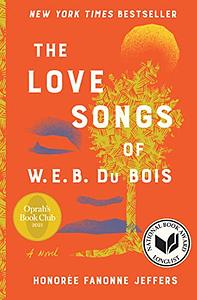You need to sign in or sign up before continuing.
Take a photo of a barcode or cover
"Even in a place of sorrow, time passes. Even in a place of joy."
It is, quite plainly put, an absolutely stunning novel. So many professional reviewers have noted that if this isn't a Great American Novel, then I don't know what is — a sentiment with which I can completely agree. What Jeffers has accomplished with this utterly engrossing, panoramic story is impressive and masterful.
Covering generations of several families, weaving in and out of each others' paths, Jeffers has penned a novel that relays so much pain alongside so much love. There's a genuine quality that is sharp and poignant. Jeffers does not deal in softening the blow; there are no silencers here. Each punch, each gunshot is impactful and loud — with a lasting reverberation felt through the entire the book.
"There was implicit, hushed violence in the brightly colored scene...."
Stylistically, Jeffers is in a storyteller mode. Even in the passages that are first-person narration, the delivery remains up and above the story itself. For me this was frustrating, especially for the first half of the book. This is a long book with a multitude of characters, covering hundreds of years. And what amounts to introductions covers a good portion of the first third, at least. So to be held at arm's length, when all I wanted to do was get to know everyone intimately, made for a slower and more deliberate reading experience. I felt very much as if I were chasing around an interviewee as she told me her and her family's story, throwing bits and pieces at me over her shoulder, all the while I struggle to keep pace.
However, looking back on this now, I cannot imagine how emotionally torn up I'd have been if that distance were not there. I don't think I could've taken some of those scenes any closer. Jeffers wins with her instincts and wisdom in this choice.
On a personal note, having driven past this iconic "Peach Butt" in Gaffney, South Carolina, that Jeffers mentions repeatedly in the present day storyline — I loved how it's used as a mile marker for her characters traveling down into Georgia. That rings so true and just drips with a realness that only comes from having known it, too.
This book is an investment — of your time, of your patience, of your emotions — and it pays off in ways that will stay with you long after you close the back cover.
It is, quite plainly put, an absolutely stunning novel. So many professional reviewers have noted that if this isn't a Great American Novel, then I don't know what is — a sentiment with which I can completely agree. What Jeffers has accomplished with this utterly engrossing, panoramic story is impressive and masterful.
Covering generations of several families, weaving in and out of each others' paths, Jeffers has penned a novel that relays so much pain alongside so much love. There's a genuine quality that is sharp and poignant. Jeffers does not deal in softening the blow; there are no silencers here. Each punch, each gunshot is impactful and loud — with a lasting reverberation felt through the entire the book.
"There was implicit, hushed violence in the brightly colored scene...."
Stylistically, Jeffers is in a storyteller mode. Even in the passages that are first-person narration, the delivery remains up and above the story itself. For me this was frustrating, especially for the first half of the book. This is a long book with a multitude of characters, covering hundreds of years. And what amounts to introductions covers a good portion of the first third, at least. So to be held at arm's length, when all I wanted to do was get to know everyone intimately, made for a slower and more deliberate reading experience. I felt very much as if I were chasing around an interviewee as she told me her and her family's story, throwing bits and pieces at me over her shoulder, all the while I struggle to keep pace.
However, looking back on this now, I cannot imagine how emotionally torn up I'd have been if that distance were not there. I don't think I could've taken some of those scenes any closer. Jeffers wins with her instincts and wisdom in this choice.
On a personal note, having driven past this iconic "Peach Butt" in Gaffney, South Carolina, that Jeffers mentions repeatedly in the present day storyline — I loved how it's used as a mile marker for her characters traveling down into Georgia. That rings so true and just drips with a realness that only comes from having known it, too.
This book is an investment — of your time, of your patience, of your emotions — and it pays off in ways that will stay with you long after you close the back cover.
LOVE SONG is an epic that chronicles the ancestry of an American family. With intimate prose and luminous writing, Jeffers depicts indigenous peoples and their connections to the ancestral land, the brutality of the slave trade and the resilience of those in bondage, and the Civil War unrest followed by the ensuing era of the Civil Rights movement.
The book follows two narratives, starting with indigenous people and their displacements by the colonizers, all the way to Samual Pinchard, an enslaver and plantation owner. The "Songs" portion portrays harrowing details of severed connections — losing one's land, culture, and family.
The second narration follows Ailey Garfield, a black woman who grew up in Chicasetta, a rural Georgia town where her family resided for generations. Ailey's difficulty fitting in and forming connections is exasperated by her childhood trauma. As she navigates young adulthood and grapples with her identity, Ailey finds herself drawn to her family's past. She must now reconcile the tumultuous history behind her family's history to find her true self.
LOVE SONG is a masterpiece that covers so much ground it's impossible to discuss them all here. I am particularly drawn to the generational trauma that continues throughout Ailey's maternal ancestors and perpetuates in her generation. The book examines power imbalance, gender inequality, colorism, and social & economic status, and how these play into sustaining the trauma Ailey and her sisters endured growing up. These discussions are explored extensively through different characters and the choices they make.
LOVE SONG is, at times, a demanding read because of the multitude of pain and grief the characters experience. Nonetheless, it's an important book that illustrates the multigenerational heritage of Black Americans and a courageous review of our nation's brutal past of colonialism and slavery.
The book follows two narratives, starting with indigenous people and their displacements by the colonizers, all the way to Samual Pinchard, an enslaver and plantation owner. The "Songs" portion portrays harrowing details of severed connections — losing one's land, culture, and family.
The second narration follows Ailey Garfield, a black woman who grew up in Chicasetta, a rural Georgia town where her family resided for generations. Ailey's difficulty fitting in and forming connections is exasperated by her childhood trauma. As she navigates young adulthood and grapples with her identity, Ailey finds herself drawn to her family's past. She must now reconcile the tumultuous history behind her family's history to find her true self.
LOVE SONG is a masterpiece that covers so much ground it's impossible to discuss them all here. I am particularly drawn to the generational trauma that continues throughout Ailey's maternal ancestors and perpetuates in her generation. The book examines power imbalance, gender inequality, colorism, and social & economic status, and how these play into sustaining the trauma Ailey and her sisters endured growing up. These discussions are explored extensively through different characters and the choices they make.
LOVE SONG is, at times, a demanding read because of the multitude of pain and grief the characters experience. Nonetheless, it's an important book that illustrates the multigenerational heritage of Black Americans and a courageous review of our nation's brutal past of colonialism and slavery.
Love Songs tells the story of one American family through generations along their matrilineal line from slavery right up to present day, following Ailey Garfield, her mother Belle and sister Lydia, descendants of enslaved Georgians and tenant farmers. It is a tale of trauma, cruelty and oppression, but also resistance, strength, and identity.
I read this book very slowly over several weeks, and like most enormous books, I found my interest waxed and waned depending on what was happening in the story. I definitely had a slumpy bit in the middle, and wasn’t as invested in Lydia’s chapters which I felt weren’t as strongly-written, but the slump was bookended by some fantastic writing which had me super engaged.
The character development and creation of the family tree were superb and I really appreciated how everything linked back together throughout this multigenerational epic. The stories of these strong and resilient Black and Indigenous women were heartbreaking and at times tragic, but also inspiring and hopeful.
I didn’t absolutely love this to death as other people have, and I’m a firm believer that no book actually needs to be 800 pages long, but overall I really enjoyed it and recommend if you’re so inclined to pick up this chonker of a novel. It really was something.
I read this book very slowly over several weeks, and like most enormous books, I found my interest waxed and waned depending on what was happening in the story. I definitely had a slumpy bit in the middle, and wasn’t as invested in Lydia’s chapters which I felt weren’t as strongly-written, but the slump was bookended by some fantastic writing which had me super engaged.
The character development and creation of the family tree were superb and I really appreciated how everything linked back together throughout this multigenerational epic. The stories of these strong and resilient Black and Indigenous women were heartbreaking and at times tragic, but also inspiring and hopeful.
I didn’t absolutely love this to death as other people have, and I’m a firm believer that no book actually needs to be 800 pages long, but overall I really enjoyed it and recommend if you’re so inclined to pick up this chonker of a novel. It really was something.
The historical stories were brilliant, beautifully written, moving, and heartfelt. The contemporary portions were disappointing -- characters had little or no development or increase in maturity, speech patterns, assumptions, or wisdom gained from sad experience, and many of them were indistinguishable from one another. 4 stars is rounding up. I wanted to love this book wholeheartedly and am disappointed that I didn't.
A beautiful kaleidoscope of black women lineage. Heartbreaking, sad, but hopeful. Master class of character development.
I don't know that I can write a review that does this beautifully hard story justice, so I'll not try. I do know that the story and characters will be with me forever.
adventurous
challenging
emotional
hopeful
inspiring
reflective
sad
fast-paced
Being an Oprah's Book Club pick is often the kiss-of-death for a book for me. Fortunately, I read this one despite the "drawback." What a masterful job interweaving family history with modern times into a truly powerful family saga. With any book measuring over 700 pages, you have to wonder if it needed a better editor. There isn't much this could leave out and still create the same sense of deeply lived experience. Highly recommended.





